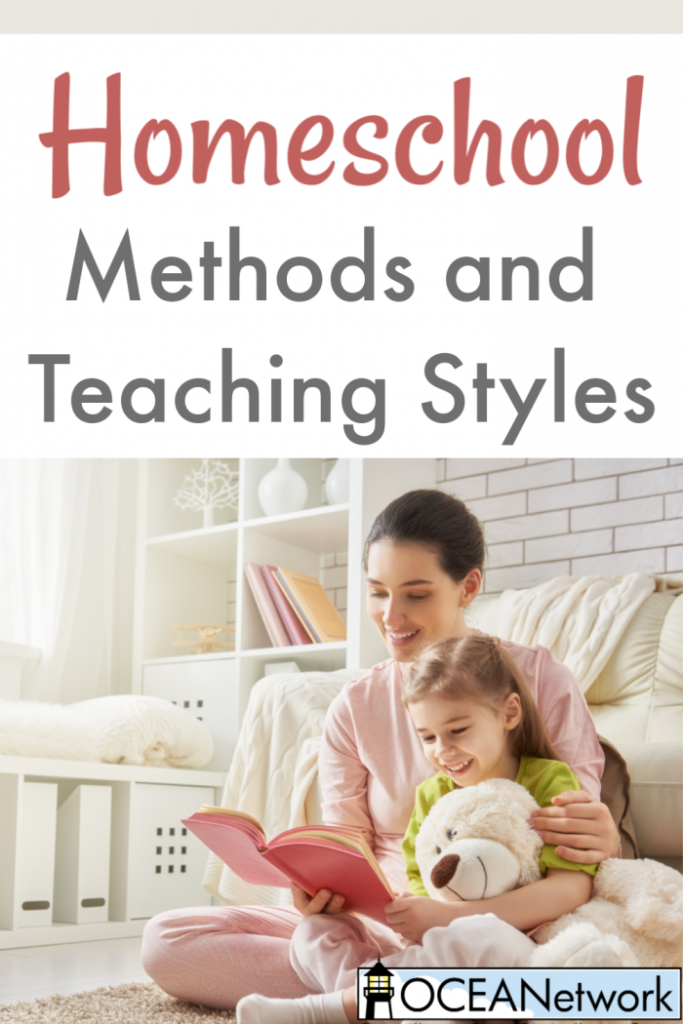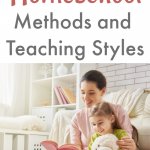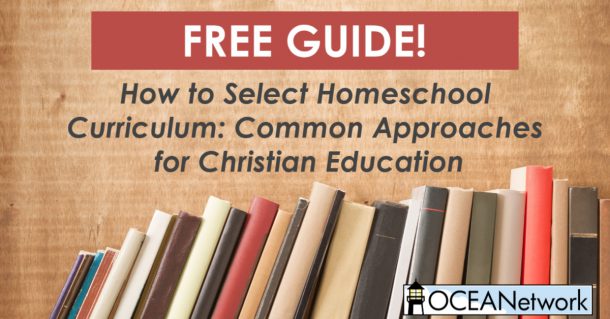Nowadays there are as many styles of homeschooling as there are homeschool families. When first starting out, it can be easy to get overwhelmed by the wealth of information and resources out there. Where do we start? One helpful way to begin planning your homeschool and choose curriculum is to explore the homeschool methods or teaching styles available. Read below and see which methods resonate with you most and some Christian curriculum options that correspond. Often, new homeschoolers will choose curriculum within their one or two favorite methods.
Don’t worry about picking the “right” method, though! Just begin with what seems like the best fit and eventually you’ll adapt resources and methods to best fit your unique homeschool needs and goals.

Traditional / Textbook
Homeschool parents may feel more comfortable starting out with textbooks or a traditional school style because they used them when they were in school. Textbooks follow a scope and sequence that assumes a typical school year. Each publisher has its own distinctive point of view, philosophy of education and doctrinal distinctions.
Textbooks give the parent/teacher the assurance that the necessary material is being covered and are generally open-and-go. A possible downside is a more rigid and school-like experience. The amount of teacher preparation or involvement required will vary. Some traditional textbooks are in the worktext format. Worktext material is given to the students in small chunks in workbooks that the students write in.
Textbook Curriculum Choices
- Abeka (Abeka Academy is their online option)
- BJU Press Homeschool (online courses available)
- Christian Liberty Academy
- Milestone Books (includes Rod & Staff and Pathway)
- Alpha Omega Publications (includes Horizons, LIFEPAC, as well as Monarch and Switched-On Schoolhouse for digital solutions)
- Accelerated Christian Education (ACE)
- Christian Light Education
Charlotte Mason / Literature-Based
Based on the writings of turn-of-the-century educator, Charlotte Mason, this approach emphasizes respecting children as persons, involving them in real-life situations, and allowing them to read and internalize really good books instead of predigested “twaddle.”
Children are taught basic reading, writing, and math skills. Then they are exposed to the best sources of knowledge in all other subjects and allowed to draw their own conclusions. Narration plays a large role in reinforcing and evaluating learning. Other marks of Charlotte Mason homeschooling are the use of copy work and dictation, nature studies and journaling, use of living books, and short lessons.
Many newer homeschool curriculums are based around good literature. (They are often called literature-based or living books curricula.) While they don’t incorporate all of Miss Mason’s approach, some of the more popular ones have been listed here.
Learn More About the Charlotte Mason Method
- Charlotte Mason Companion, Karen Andreola
- A Charlotte Mason Education: A Home Schooling How-To Manual, Catherine Levison
- For the Children’s Sake, Susan Schaeffer Macaulay
Charlotte Mason Curriculum Choices
(Some of these are pure CM curricula and some are inspired by the CM method and may incorporate other methods as well.)
- A Gentle Feast
- Ambleside Online
- Simply Charlotte Mason
- Beautiful Feet Books
- Heart of Dakota
- Queens Homeschooling
- Five in a Row
Unit Studies
Unit studies incorporate Bible, language arts, reading, history, social studies, art, and science as they apply to an in-depth study on one topic. (Phonics and mathematics may be incorporated to some extent but will also need to be taught separately.) This demonstrates to the child that life isn’t sliced into subjects. Unit studies usually use hands-on experiences or activities to generate interest and retention of knowledge.
The whole family can study a topic together with assignments given to the students depending on their ability, sparing the parent/teacher that fragmented feeling. Unit studies do require teacher preparation time: research in the library, gathering materials from many sources. Without planning, they can also leave the timid a little unsure whether the children have really learned what they are “supposed to” for their grade.
Learn More About Unit Studies
- How to Create Your Own Unit Study, Valerie Bendt
- What Your Child Needs to Know When, Robin Scarlatta
Unit Study Curriculum Choices
- Konos Character Curriculum
- Geo Matters and Trail Guide to Learning
- The Weaver Curriculum
- Homeschool in the Woods
- Unit Studies by Amanda Bennett
- In the Hands of a Child
‘The Classical Approach
The classical philosophy, or Trivium, emphasizes the skills of memorizing, reasoning and communicating by which any subject can be understood. Since children ages 6-10 can most readily memorize, they are taught basic facts. At 10-15, when they become more independent thinkers, they learn logic and how to draw correct conclusions. At 15-18 they are taught to use language eloquently and persuasively to communicate. Classical education emphasizes the study of history through classical literature.
Learn More About Classical Education
- Teaching the Trivium, Laurie and Harvey Bluedorn
- The Well-Trained Mind, Jessie Wise and Susan Wise Bauer (secular)
- Recovering the Lost Tools of Learning, Douglas Wilson
Classical Curriculum Choices
- Memoria Press
- Classical Conversations
- Veritas Press
- Tapestry of Grace
- Biblioplan
- Claritas Classical Academy
Unschooling
John Holt, the founder of the unschooling movement, felt that children have an innate drive to learn what they want to learn when they need it. In practice, unschooling is a non-structured approach that allows children to pursue their own interests with varying degrees of parental guidance. The child is surrounded by a rich environment of books, learning resources and adults. Formal academics, if pursued at all, are pursued as the need arises.
Not many Christians practice unschooling in its pure form. Christians parents are instructed to “Train up a child in the way he should go, and when he is old he will not depart from it,” (Proverbs 22:6). Parents are commanded in Scripture to teach, train and disciple their children. “Foolishness is bound in the heart of a child,” (Proverbs 22:15) so letting them direct their own educational experiences seems unwise.
There are some things we can glean from unschooling, however. Unschooling stresses the importance of letting children be a part of the adult world and being involved in “real” activities. Children can also benefit from the rich learning environment emphasized by unschoolers.
Delight-Directed
Some people use the terms delight-directed and unschooling interchangeably. (They may also call it child-led or relaxed homeschooling.) However, there are some differences between them to consider.
Delight-directed homeschoolers typically use some kind of curriculum at least for certain subjects, while most unschoolers do not. Many delight-directed homeschoolers use curriculum specifically for the 3 R’s (reading, writing, and math) but allow their children to pursue what interests them for other subjects, providing experiences and materials to help them do that.
Delight-directed homeschooling can also be incorporated into many other methods. For example, a homeschool student may explore electives based on their interests, or a family may choose to do year-round homeschooling but pursue only delight-directed learning in the summer. The materials used for delight-directed learning can come from a variety of sources, most often living books, field trips, unit studies, and even engaging textbooks or courses.
Eclectic Homeschooling
When it comes right down to it, most veteran home educators borrow little pieces from many approaches. They may use a textbook for math, use a 4-year history cycle following the classical model, do a holiday unit study for Christmas, and enjoy nature studies for science as Charlotte Mason would do. Eclectic homeschooling simply means using whatever resources and aspects of various methods best suit the teacher and students.
Many publishers and curriculum choices can be considered eclectic as well. A particular curriculum may include elements drawn from several homeschool method. Publishers may also provide a variety of curriculum choices or lines, each leaning toward different methods or teaching styles. Examples of more eclectic curriculum options or publishers include Master Books, Sonlight, Timberdoodle, and My Father’s World.
Other Homeschooling Methods
There are several other homeschooling methods you may want to look into further. Here are just a few:
- The Principle Approach – Teaches students to reason biblically through every area of life using 7 core biblical principles.
- Montessori – Parent facilitates a child-led education that teaches self-regulation and provides materials and experiences to explore their interests.
- Thomas Jefferson Education – “Leadership education” through the classics, and interest-led discussion provided by the parent
What About Online Schools?
Several publishers offer online courses. However, be sure to note whether the online course or “school” is intended for independent homeschoolers or is actually an online public school at home option. A charter school is not a homeschool method. According to the state of Oregon’s laws, enrolling in a charter school or public school at home option places the family under public school laws rather than homeschool laws. It also comes with requirements as far as what testing must be done and what kind of curriculum can be used with the charter school. For more information, see Four Kinds of Education in Oregon.
Homeschooling allows a great deal of flexibility to tailor education to both children and family needs. For that, we are thankful. In the coming days we’ll be providing a more complete list of curriculum choices and homeschool publishers. We’ll also be providing tips on how you can take your children’s learning styles into consideration and 10 tips for choosing the right homeschool curriculum for you!
You Might Also Like…
Getting Started Homeschooling in Oregon


